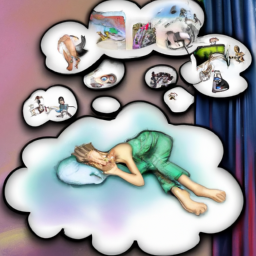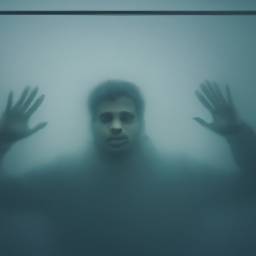Dreams always had me wondering—do they zip by in mere minutes or take their sweet time, unfolding over hours? Fascination with the brain’s mysteries drove me to dig deep and uncover the truth about dream length.
Dreams can be incredibly vivid and lifelike, but their duration can be difficult to determine as we don’t have a true sense of time in the dream world. However, research has shown that dreams typically last between five and twenty minutes.
Of course, there are exceptions to this rule, and some dreams can feel like they last for hours, while others are over in the blink of an eye. In this article, I’ll be exploring the factors that affect dream duration, as well as the science behind dreaming and time perception.
I’ll also be sharing some tips on how to improve your dream recall and duration, so let’s get started!
Key Takeaways
- Dreams typically last 5-20 minutes.
- The duration of dreams varies from person to person and night to night, and can be affected by sleep cycle and external factors such as medication, alcohol, and sleep deprivation.
- Brain activity during dreams varies greatly and can mimic waking activity, with the prefrontal cortex less active and the amygdala more active in processing emotions. The visual cortex is also active in processing visual information.
- Techniques for improving dream recall and duration include maintaining a consistent sleep schedule, practicing relaxation techniques, keeping a dream journal, and using reality checks, visualization, and affirmations.
Overview of Dream Duration
You might be surprised to know that your dreams usually only last for a few minutes at a time. While it may feel like you’ve been dreaming for hours, studies have shown that the average dream only lasts between 5 to 20 minutes.
This is because our brains are constantly cycling through different stages of sleep, and dreams occur during the rapid eye movement (REM) stage, which usually only lasts for a few minutes.
However, it’s important to note that the length of a dream can vary from person to person and even from night to night. Some people may have longer or more vivid dreams than others, and certain factors such as sleep deprivation or medication use can also affect dream duration.
So while dreams may be short, they can still be powerful and have a significant impact on our thoughts and emotions.
Factors Affecting Dream Duration
When your mind is in a deep sleep, it tends to create longer and more vivid dreams, but when you’re experiencing a lighter stage of sleep, your dreams may be shorter and more fragmented. This is because the length and intensity of your dreams are affected by your sleep cycle.
Your sleep cycle consists of four stages of non-REM sleep and one stage of REM sleep, and each stage lasts for different amounts of time. During the first few stages of non-REM sleep, your dreams are usually shorter and less memorable, but as you enter into the deeper stages of non-REM sleep and REM sleep, your dreams can become longer and more elaborate.
The duration of your dreams can also be affected by external factors, such as medication, alcohol, and sleep deprivation. For example, certain medications can disrupt your sleep cycle, which can affect the length and quality of your dreams. Additionally, alcohol and sleep deprivation can also impact the length and intensity of your dreams.
Understanding these factors can help you better understand your dreams and how they are influenced by your daily habits and lifestyle. With that in mind, let’s dive into the science of dreaming.
The Science of Dreaming
I find it fascinating to learn about the science behind dreaming.
Two key points that stand out to me are the brain activity that occurs during dreams and the interpretation of those dreams.
It’s intriguing to think about how our brains create these vivid experiences while we sleep and what they might mean for our waking lives.
Brain Activity during Dreams
Did you know that the brain activity during dreams varies greatly and can sometimes mimic the same activity as when we’re awake? It’s true!
When we’re in the rapid eye movement (REM) stage of sleep, our brain activity increases and can even surpass the activity levels when we’re awake. Our brainwaves during this stage are similar to those when we’re in a state of alertness, which is why we sometimes experience vivid and realistic dreams that feel like they’re really happening.
Here are some interesting facts about brain activity during dreams:
-
The prefrontal cortex, which is responsible for decision-making and problem-solving, is less active during dreams. This is why we often experience bizarre and illogical situations in our dreams.
-
The amygdala, which is responsible for processing emotions, is more active during dreams. This is why we can sometimes have intense emotional experiences during our dreams.
-
The visual cortex, which is responsible for processing visual information, is also active during dreams. This is why we’re able to see and experience vivid imagery in our dreams.
Speaking of dreams, have you ever wondered what they could mean? Dream interpretation has been a topic of interest for centuries, and there are many theories and interpretations out there.
Dream Interpretation
Explore the fascinating world of dream interpretation and discover the hidden meanings behind your nighttime adventures. Dreams have been a source of wonder and mystery for centuries, and many people believe that they hold clues to our subconscious thoughts and emotions. While there is no one-size-fits-all method for interpreting dreams, there are a number of common themes and symbols that can help us understand what our minds are trying to tell us.
To get started with dream interpretation, it can be helpful to keep a dream journal. This can be as simple as jotting down a few notes about your dreams each morning, or as detailed as a full-blown journal with sketches and descriptions. Once you have a record of your dreams, you can start looking for patterns and themes. For example, you may notice that you frequently dream about being chased, which could indicate a feeling of anxiety or a need to escape from something in your waking life. Alternatively, you may dream about flying, which could signify a sense of freedom or a desire for greater independence.
As we continue to explore the science of dreams, we may begin to unravel more of the mysteries behind our nighttime adventures, including the phenomenon of lucid dreaming and our perception of time.
Lucid Dreaming and Time Perception
You might feel like you’re in a time warp during a lucid dream, as time can seem to move at an accelerated pace. It’s not uncommon for a dream that feels like it lasted for hours to actually only last a few minutes in real time. This phenomenon is known as time dilation and is one of the unique aspects of lucid dreaming.
To better understand time perception in lucid dreams, here are three things to consider:
-
The level of lucidity can affect time perception, with more lucid dreams often feeling longer in duration.
-
Emotional intensity can also play a role, as dreams with heightened emotions tend to feel longer.
-
The content of the dream can also impact time perception, with dreams that are more complex or detailed feeling longer.
As you work on improving your lucid dreaming skills, it’s important to also focus on improving your dream recall and duration. By implementing tips such as keeping a dream journal and setting intentions before sleep, you can increase the likelihood of having longer and more vivid dreams.
Tips for Improving Dream Recall and Duration
To enhance your dream recall and duration, it’s crucial to keep a consistent sleep schedule and prioritize relaxation techniques before bed. This means going to bed and waking up at the same time every day, even on weekends, to regulate your body’s natural sleep rhythms. Additionally, practicing relaxation techniques such as meditation, deep breathing, or gentle stretching can help calm your mind and prepare you for a restful night’s sleep.
Another helpful technique for improving dream recall and duration is keeping a dream journal. This involves writing down any dreams you remember as soon as you wake up, even if they seem insignificant or fragmented. Over time, this practice can help train your brain to remember more of your dreams and potentially even lead to more vivid and detailed dream experiences. Check out the table below for more tips on improving dream recall and duration.
| Tip | Description | Example | |
|---|---|---|---|
| Reality checks | Throughout the day, ask yourself if you’re dreaming and perform a simple test to confirm | Count your fingers or try to push your finger through your hand | |
| Visualization | Before bed, imagine yourself becoming aware and in control of your dreams | Imagine yourself flying or exploring a new world | |
| Affirmations | Repeat a positive phrase to yourself before bed such as "I will remember my dreams" | "I am a skilled lucid dreamer" | ‘I am capable of experiencing vivid and fulfilling lucid dreams’ |
Frequently Asked Questions
Can dreams occur even during short naps?
Wow, it’s amazing how vivid dreams can be even during a short nap! I’ve experienced dreams that feel like hours, despite only sleeping for a few minutes. It’s incredible how our minds can create such detailed and complex scenarios in such a short amount of time.
Do people dream more frequently as they age?
As I age, I do not necessarily dream more frequently, but I do find that my dreams become more vivid and memorable. However, the frequency and content of dreams can vary from person to person.
Can the same dream be experienced multiple times?
Did you know that 75% of people have recurring dreams? It’s possible to experience the same dream multiple times, with slight variations each time. It’s a fascinating phenomenon that leaves me wondering why certain dreams repeat.
Is there a correlation between dream duration and the level of stress a person experiences?
I’ve found no conclusive evidence of a direct correlation between dream duration and stress levels. However, stress can affect the frequency and intensity of dreams, potentially making them feel longer.
Can medications or certain foods affect dream duration?
Certain substances and edibles can have an impact on the length of my dreams. I’ve noticed that after consuming them, my dreams tend to last longer than usual. It’s important to be aware of these effects.
Conclusion
So, how long do dreams normally last? It’s difficult to give a definitive answer, but dreams can typically range from a few seconds to up to an hour. However, the duration of a dream is influenced by various factors such as sleep stage, age, and even medications.
As fascinating as the science of dreaming may be, it’s important to remember that not all dreams are created equal. Some are forgettable, while others can leave a lasting impact on our psyche.
Dreams can be like fireflies flickering in the night sky – fleeting, yet mesmerizing. And just like fireflies, we can capture and hold onto these dreams by improving our ability to recall and prolong their duration.
With a little practice, we can unlock the full potential of our dreaming mind and experience the magic of our subconscious in all its glory.









